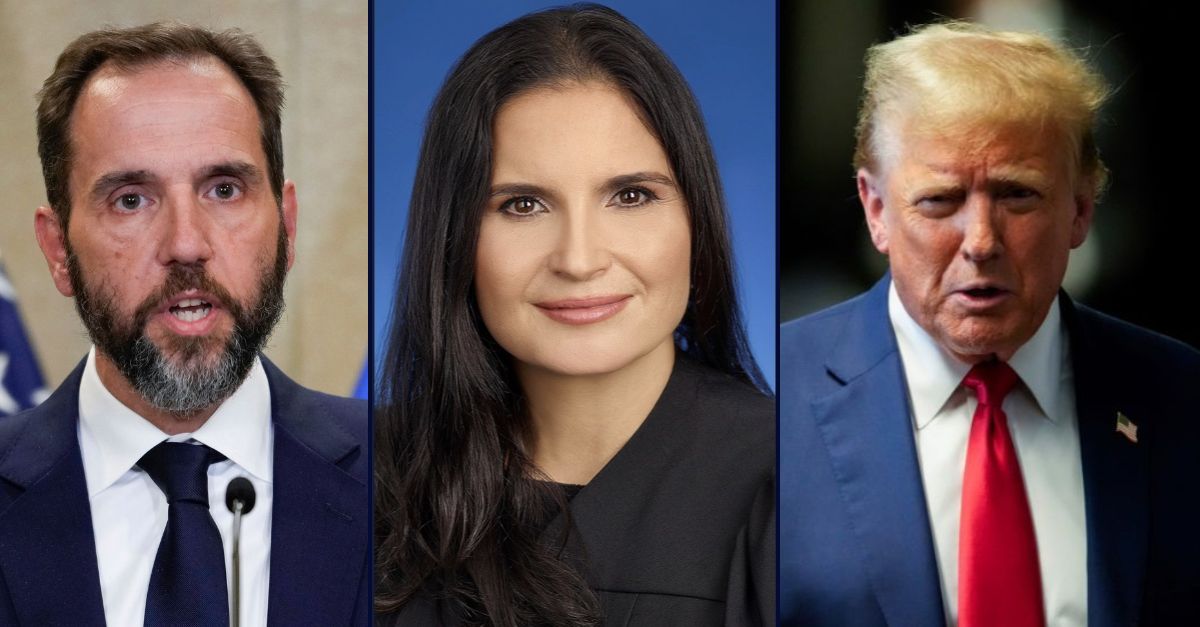
Left: FILE – Special counsel Jack Smith speaks to the media about an indictment of former President Donald Trump, Aug. 1, 2023, at an office of the Department of Justice in Washington (AP Photo/J. Scott Applewhite, File). Center: U.S. District Judge Aileen Cannon (U.S. District Court for the Southern District of Florida). Right: Donald Trump speaks to members of the media before departing Manhattan criminal court, Monday, May 6, 2024, in New York (AP Photo/Julia Nikhinson, Pool).
A First Amendment advocacy nonprofit at Columbia University on Monday reminded U.S. District Judge Aileen Cannon that three months have passed since the group urged her to lift an injunction blocking the release of special counsel Jack Smith”s full report on the Mar-a-Lago classified documents probe and erstwhile Espionage Act prosecution of President Donald Trump.
The Knight First Amendment Institute filed a brief “Notice of Ninety Days Expiring” in Cannon’s court, urging the Trump-appointed judge to rule on whether it can intervene in the case for the purpose of doing away with the injunction.
The group has said the injunction must be lifted so a separate Freedom of Information Act (FOIA) lawsuit can proceed without roadblocks in pursuit of the secret Volume II of Smith’s report on former defendants Trump, Trump valet Waltine “Walt” Nauta, and Mar-a-Lago property manager Carlos de Oliveira.
“To date, there has not been a ruling on Intervenor’s Motion to Intervene, and 90 days have elapsed since the Intervenor filed its Reply,” the filing says. “Intervenor respectfully notifies the Court that its Motion to Intervene is ripe for adjudication.”
Following what was in her words “careful study,” Cannon invalidated special counsel Jack Smith’s appointment in July 2024 and dismissed Trump’s case. Several months later — and after Trump was inaugurated for a second time — the DOJ swiftly tossed the cases against Nauta and de Oliveira.
Cannon, almost immediately after the change in administrations, then blocked what had been the Biden administration DOJ’s attempt to hand certain members of Congress a copy of Volume II.
Love true crime? Sign up for our newsletter, The Law&Crime Docket, to get the latest real-life crime stories delivered right to your inbox
In March, the Trump administration’s DOJ argued that the proposed interventions of the Knight Institute and American Oversight should be rejected and that the injunction should stay in place.
But even if Cannon were “inclined to lift” the injunction, she shouldn’t release the full version of Smith’s report because that is ultimately up to U.S. Attorney General Pam Bondi, said the government.
“The United States respectfully submits that the Court should deny the motions to intervene filed by American Oversight and Knight Institute in this closed criminal case. First, neither American Oversight nor Knight Institute has shown that this case fits within the narrow class of circumstances in which courts have previously allowed third parties to intervene in criminal cases,” the DOJ asserted. “This Court should not expand that class.”
“Second, neither American Oversight nor Knight Institute has shown it has a common law or First Amendment right of access to Volume II of Jack Smith’s confidential Final Report,” the DOJ added.
The DOJ filing came after Cannon had 11 days earlier allowed “prospective” intervenors the Knight Institute and American Oversight to file briefs in reply.
The Knight Institute, for its part, emphasized in a late-March reply that Nauta and de Oliveira’s opposition to disclosure of the full Smith report does not override the public’s interest in learning more about the investigation into and prosecution of Trump.
“Ex-Defendants have not met their burden of showing good cause or a compelling interest sufficient to overcome the presumption of access,” the filing said. “The public interest in the release of Volume II is paramount, because it concerns a public official of the highest rank and addresses a matter of public concern—the investigation and prosecution of a former president for the alleged willful retention of military secrets.”
“Public access to Volume II will also promote public understanding of historically significant events and of our judicial system,” the Knight Institute continued.
Since that filing, the Knight Institute noted Monday, Cannon’s Mar-a-Lago docket has been radio silent on the motions to intervene.
On the separate FOIA front, the New York Times remains locked in a lawsuit against the DOJ and maintains the case should not be thrown out, let alone due to Cannon’s injunction — which the Times called a “nullity.”
As recently as June 27, attorneys for the Times, led by deputy general counsel David McCraw, stated that Cannon didn’t have the jurisdiction to issue the injunction in the first place.
“Specifically at issue is whether DOJ can thwart the public’s rights under FOIA by relying on, and in fact endorsing, an injunction that was issued by a court lacking jurisdiction—even after the fair-trial rationale for the injunction has now disappeared and after DOJ during the Biden administration declared that an earlier version of the same injunction was procedurally improper,” the Times argued. “DOJ seeks the blessing of this Court to throw up its hands and say there is nothing it can do to protect the public’s rights under FOIA even though DOJ’s own actions and inactions have helped cause the loss of those rights.”
Calling the Trump administration’s “reliance” on Cannon’s injunction “fatally flawed,” the Times asked U.S. District Judge Gregory Woods III, a Barack Obama appointee in New York, not to let the DOJ “dodge its responsibilities to the public by acquiescing to an improper and invalid injunction that impedes the public transparency required by FOIA.”
“DOJ should be required to complete processing of The Times’s FOIA request, including moving the court in the Southern District of Florida to end or modify the injunction in light of DOJ’s FOIA obligations,” the filing said.





